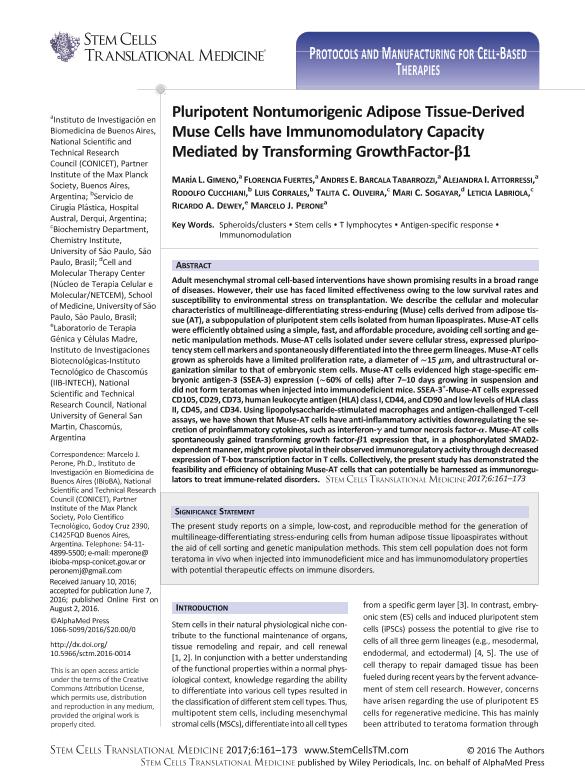Artículo
Pluripotent nontumorigenic adipose tissue-derived muse cells have immunomodulatory capacity mediated by transforming growthfactor-β1
Gimeno, Maria Laura ; Fuertes, Florencia
; Fuertes, Florencia ; Barcala Tabarrozzi, Andrés Ezequiel
; Barcala Tabarrozzi, Andrés Ezequiel ; Attorressi, Alejandra I.; Cucchiani, Rodolfo; Corrales, Luis; Oliveira, Talita C.; Sogayar, Mari C.; Labriola, Leticia
; Attorressi, Alejandra I.; Cucchiani, Rodolfo; Corrales, Luis; Oliveira, Talita C.; Sogayar, Mari C.; Labriola, Leticia ; Dewey, Ricardo
; Dewey, Ricardo ; Perone, Marcelo Javier
; Perone, Marcelo Javier
 ; Fuertes, Florencia
; Fuertes, Florencia ; Barcala Tabarrozzi, Andrés Ezequiel
; Barcala Tabarrozzi, Andrés Ezequiel ; Attorressi, Alejandra I.; Cucchiani, Rodolfo; Corrales, Luis; Oliveira, Talita C.; Sogayar, Mari C.; Labriola, Leticia
; Attorressi, Alejandra I.; Cucchiani, Rodolfo; Corrales, Luis; Oliveira, Talita C.; Sogayar, Mari C.; Labriola, Leticia ; Dewey, Ricardo
; Dewey, Ricardo ; Perone, Marcelo Javier
; Perone, Marcelo Javier
Fecha de publicación:
01/2017
Editorial:
Wiley Blackwell Publishing, Inc
Revista:
Stem Cells Translational Medicine
ISSN:
2157-6580
Idioma:
Inglés
Tipo de recurso:
Artículo publicado
Clasificación temática:
Resumen
Adult mesenchymal stromal cell-based interventions have shown promising results in a broad range of diseases. However, their use has faced limited effectiveness owing to the low survival rates and susceptibility to environmental stress on transplantation. We describe the cellular and molecular characteristics of multilineage-differentiating stress-enduring (Muse) cells derived from adipose tissue (AT), a subpopulation of pluripotent stem cells isolated from human lipoaspirates. Muse-AT cells were efficiently obtained using a simple, fast, and affordable procedure, avoiding cell sorting and genetic manipulation methods. Muse-AT cells isolated under severe cellular stress, expressed pluripotency stem cell markers and spontaneously differentiated into the three germ lineages. Muse-AT cells grown as spheroids have a limited proliferation rate, a diameter of ∼15 mm, and ultrastructural organization similar to that of embryonic stem cells. Muse-AT cells evidenced high stage-specific embryonic antigen-3 (SSEA-3) expression (∼60% of cells) after 7–10 days growing in suspension and did not form teratomas when injected into immunodeficient mice. SSEA-3+-Muse-AT cells expressed CD105, CD29, CD73, human leukocyte antigen (HLA) class I, CD44, and CD90 and low levels of HLA class II, CD45, and CD34. Using lipopolysaccharide-stimulated macrophages and antigen-challenged T-cell assays, we have shown that Muse-AT cells have anti-inflammatory activities downregulating the secretion of proinflammatory cytokines, such as interferon-γ and tumor necrosis factor-α.Muse-AT cells spontaneously gained transforming growth factor-β1 expression that, in a phosphorylated SMAD2-dependent manner, might prove pivotal in their observed immunoregulatory activity through decreased expression of T-box transcription factor in T cells. Collectively, the present study has demonstrated the feasibility and efficiency of obtaining Muse-AT cells that can potentially be harnessed as immunoregulators to treat immune-related disorders.
Palabras clave:
STEM CELLS
,
AT-MUSE
,
DIABETES
,
PLURIPOTENT
Archivos asociados
Licencia
Identificadores
Colecciones
Articulos(IBIOBA - MPSP)
Articulos de INST. D/INV.EN BIOMED.DE BS AS-CONICET-INST. PARTNER SOCIEDAD MAX PLANCK
Articulos de INST. D/INV.EN BIOMED.DE BS AS-CONICET-INST. PARTNER SOCIEDAD MAX PLANCK
Citación
Gimeno, Maria Laura; Fuertes, Florencia; Barcala Tabarrozzi, Andrés Ezequiel; Attorressi, Alejandra I.; Cucchiani, Rodolfo; et al.; Pluripotent nontumorigenic adipose tissue-derived muse cells have immunomodulatory capacity mediated by transforming growthfactor-β1; Wiley Blackwell Publishing, Inc; Stem Cells Translational Medicine; 6; 1; 1-2017; 161-173
Compartir
Altmétricas



